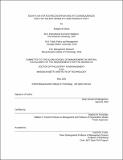| dc.contributor.advisor | Roberto M. Fernandez. | en_US |
| dc.contributor.author | Bond, Brittany M. | en_US |
| dc.contributor.other | Sloan School of Management. | en_US |
| dc.date.accessioned | 2020-09-03T16:47:13Z | |
| dc.date.available | 2020-09-03T16:47:13Z | |
| dc.date.copyright | 2020 | en_US |
| dc.date.issued | 2020 | en_US |
| dc.identifier.uri | https://hdl.handle.net/1721.1/126981 | |
| dc.description | Thesis: Ph. D., Massachusetts Institute of Technology, Sloan School of Management, May, 2020 | en_US |
| dc.description | Cataloged from PDF version of thesis. | en_US |
| dc.description | Includes bibliographical references. | en_US |
| dc.description.abstract | Organizations increasingly rely on status recognition to motivate members toward higher performance. Yet status recognition inevitably invites social comparisons. Although research in organization theory and strategy has focused on the returns to, antecedents of, and relative advantages of status recognition, whether, when, and to what extent bestowing status recognition outweigh the costs of social comparison remain open questions. My dissertation contributes to this scholarship through experimental field and archival research that illuminates the unexpected ways status recognition influences motivation, mobility, and productivity. This leads me to identify, in my first essay, how the preservation of self-image leads employees to make costly employer exits even when there are no material, career, or reputation concerns to nominal status under-recognition. In my second essay, I demonstrate how highly relational managers are more likely to artificially inflate employee performance evaluations, how this over-valuation leads to persistent underperformance, and how structured management can counteract this downside to close managerial relationships. My third essay (coauthored with Ethan J. Poskanzer), demonstrates how specialists' productivity improves after engaging in tasks that these professionals are recognized as being relatively inexpert in relative to teammates and their area of specialization. The settings I study in this dissertation pertain to professionals operating in high-status organizations: a highly competitive multinational pharmaceutical company and Major League Baseball. Overall, my dissertation contributes to our understanding of how status recognition influences motivation, mobility, and productivity in unexpected ways and among top-talent professionals in particular. This research has implications for organizational and strategy research on social status, motivation, and the management of performance review systems. | en_US |
| dc.description.statementofresponsibility | by Brittany M. Bond. | en_US |
| dc.format.extent | 149 pages | en_US |
| dc.language.iso | eng | en_US |
| dc.publisher | Massachusetts Institute of Technology | en_US |
| dc.rights | MIT theses may be protected by copyright. Please reuse MIT thesis content according to the MIT Libraries Permissions Policy, which is available through the URL provided. | en_US |
| dc.rights.uri | http://dspace.mit.edu/handle/1721.1/7582 | en_US |
| dc.subject | Sloan School of Management. | en_US |
| dc.title | Essays on status recognition and its consequences for top-talent mobility and productivity | en_US |
| dc.type | Thesis | en_US |
| dc.description.degree | Ph. D. | en_US |
| dc.contributor.department | Sloan School of Management | en_US |
| dc.identifier.oclc | 1191223711 | en_US |
| dc.description.collection | Ph.D. Massachusetts Institute of Technology, Sloan School of Management | en_US |
| dspace.imported | 2020-09-03T16:47:12Z | en_US |
| mit.thesis.degree | Doctoral | en_US |
| mit.thesis.department | Sloan | en_US |
